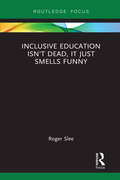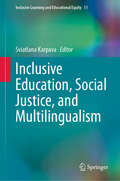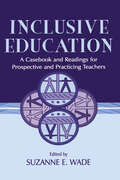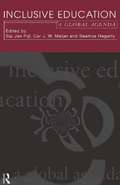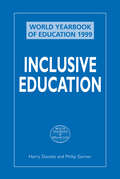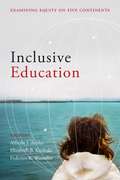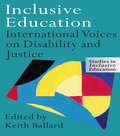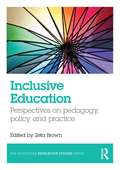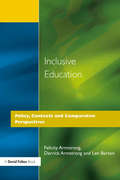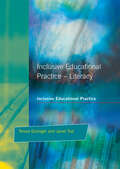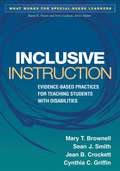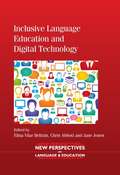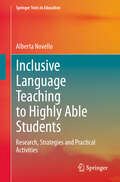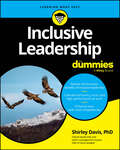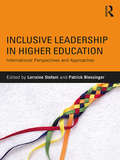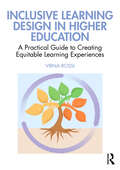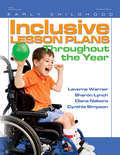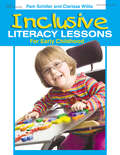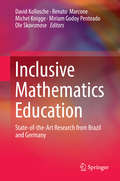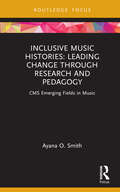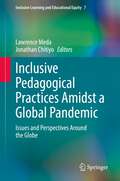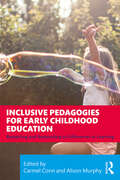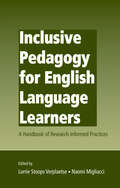- Table View
- List View
Inclusive Education isn't Dead, it Just Smells Funny
by Roger SleePositing inclusive education as a cornerstone of democracy, social equality and effective education, this unique book offers a timely response to the recent conservative backlash which has dismissed inclusive education as a field of research and practice which has become outdated and unfit for purpose. With profound insight and clarity, Slee delves deep into the architecture of modern-day schooling to show how inclusive education has been misappropriated and subverted, manifesting itself in a culture of ableism, an ethic of competitive individualism and the illusion of special educational needs. A unique book in both form and content, the author draws on music and art theory, on real-life observations and global experience, contemporary education policy and practice to reject calls for a return to segregated schooling, and put forward a compelling counterargument for schooling which models the kind of world we want our children to live in – a world of authentic, rather than divided communities. A timely response to a modern-day debate with global relevance, Inclusive Education isn’t Dead, it Just Smells Funny will be of interest to researchers and educators, policy makers, parents and practitioners with an interest in inclusive education.
Inclusive Education, Social Justice, and Multilingualism (Inclusive Learning and Educational Equity #11)
by Sviatlana KarpavaThis edited volume delves into the intricate relationships between multilingualism, inclusive education, and social justice. It presents a rich array of interdisciplinary studies that blend both theoretical and practical perspectives. The authors employ a mixed-methods approach to gather and analyze data from a diverse range of populations, including students, teachers, parents, and language policy experts across various educational levels. The book examines the dynamics of bilingual and multilingual classrooms, as well as Content and Language Integrated Learning (CLIL) environments, emphasizing the importance of linguistic and cultural diversity as valuable educational resources. It draws upon a variety of theoretical and practical approaches from applied linguistics, sociolinguistics, language policy, and education, all centered on the benefits of multilingualism, inclusive education, and social justice. The work explores the complexities of multilingualism and multiculturalism and their connections to inclusive education and social justice across different geographic regions and educational settings. It adopts a dual approach, examining both theoretical frameworks and practical realities, by incorporating the voices and perspectives of multiple stakeholders. This diverse range of viewpoints sheds light on the roles of family and school involvement in promoting multilingual education, inclusive practices, and social justice.
Inclusive Education: A Casebook and Readings for Prospective and Practicing Teachers
by Suzanne E. WadeInclusive Education includes two sections: readings and cases. The readings present approaches for creating inclusive classrooms and schools; their purpose is to give prospective and practicing teachers background information in curricular, instructional, assessment, and collaborative problem-solving strategies that foster inclusive education. The Casebook consists of "An Introduction to Cases" and 14 teaching cases based on actual events as experienced by the case authors that describe in rich detail the experiences of parents, students, and teachers related to inclusive education. Most of the cases pose problems or dilemmas to be resolved--including the struggles of parents seeking inclusive education for their children; students' attempts to succeed in general education classrooms; special educators', principals' and teachers' experiences as they collaborate in moving toward inclusive programs; and teachers' concerns for the future success of their students.
Inclusive Education: A Global Agenda (International Perspective On Reading Assessment Ser. #8)
by Seamus Hegarty Cor and Meijer Sip Jan PijlThe way in which special education is conceived varies around the world, and pratice varies accordingly. One of the current debates concerns the concepts of mainstreaming, integration and inclusion - and whether these are in fact different concepts, or simply differnt terminology. This book is based on the assumption that inclusive education is a necessary part of providing high quality education for all. Using international examples, it clarifies the rationale for inclusion and demonstrates how it can be put into practice.
Inclusive Education: Aspects Of Good Practice For Gypsy Traveller Pupils (Research Report Ser. #Vol. 238)
by Harry Daniels Philip GarnerThis volume provides overviews and approaches to inclusive education from around the world. It defines the philosophical, political, educational and social implications of "inclusion", and maps out the dilemmas facing its successful implementation.
Inclusive Education: Examining Equity On Five Continents
by Alfredo J. Artiles Elizabeth B. Kozleski Federico R. WaitollerIntroduction: equity in inclusive education / Elizabeth B. Kozleski, Alfredo J. Artiles, and Federico R. Waitoller -- pt. 1. Equity issues in first-generation inclusive education. Equity and inclusive education in Austria: a comparative analysis / Mikael Luciak and Gottfried Biewer ; Inclusive education and the interlocking of ability and race in the United States: notes for an educational equity research program / Elizabeth B. Kozleski, Alfredo J. Artiles, Federico R. Waitoller, and Christopher L. Lukinbeal ; Inclusion, place, and disadvantage in the English education system / Alan Dyson, Lisa Jones, and Kirstin Kerr ; Equity for immigrant students in German schools? / Jessica M. Löser and Rolf Werning ; Challenges and responses to inclusive education in Sweden: mapping issues of equity, participation, and democratic values / Girma Berhanu ; Ability construction, deficit thinking, and the creation of an inclusion gap for students of color in the United States: views from suburban schools / Roey Ahram and Edward Fergus -- pt. 2. Equity issues in second-generation inclusive education. Equity in inclusive education in South Africa / Petra Engelbrecht ; Inclusive education in India: the struggle for quality in consonance with equity / Nidhi Singal and Roger Jeffery ; From equity to difference: educational legal frames and inclusive practices in Argentina / Carlos Skliar and Inés Dussel ; Challenges to inclusive education in Kenya: postcolonial perspectives and family narratives / Kagendo Mutua and Beth Blue Swadener ; Conclusion: global norming / Ray McDermott, Brian Edgar, and Beth Scarloss.
Inclusive Education: International Policy & Practice
by Derrick Armstrong Ann Cheryl Armstrong Ilektra SpandagouWhat does inclusion really mean and what impact have inclusive approaches to education had on practice? Bringing together issues of theory, research, policy and practice from both the countries of the South and the North, this ground-breaking book provides a critical discussion of recent developments in the field of inclusive education. The authors consider developments, both in current thinking about the meaning of inclusion and in terms of policies and practices, in the context of education systems across the world and their differences and inter-relatedness. Topics covered include the increasing pressure on educators to develop a global policy agenda for inclusive education, the individual needs of children, the illusion of inclusivity and the importance of local contexts in determining policy. The book's international perspective illuminates common successes, failures and concerns. With case studies from Europe, the Caribbean and Australasia, the book also features chapter summaries, questions to facilitate critical thinking and discussion, case studies and suggestions for further reading. An essential read for anyone studying inclusive education, special educational needs, disability studies, social policy and international and comparative education, this book will ignite debate and enable the reader to develop a deep understanding of the issues. Ann Cheryl Armstrong is the Director of the Division of Professional Learning, Derrick Armstrong is Acting Deputy Vice Chancellor (Education) and Professor of Education and Ilektra Spandagou is a Lecturer in Inclusive Education. They are all based at the University of Sydney, Australia.
Inclusive Education: International Voices on Disability and Justice (Studies In Inclusive Education Ser.)
by Keith BallardThe aim of this text is to convey the experience of excluded children, their parents, teachers and remaining classmates. Looking at all those involved, the book offers reflections on inclusion and exclusion in the context of schools that do not cater well for diversity. The contributors and issues raised are international, giving the reader everything necessary for considering concepts and practices across countries and cultures, and highlighting ways in which schools might bring down the barriers to participation and learning.
Inclusive Education: Perspectives on pedagogy, policy and practice (The Routledge Education Studies Series)
by Zeta BrownInclusive education is complex, multi-faceted and ever-changing and to date there has been no fixed definition of what is meant by the term ‘inclusion’, leading to confusion about what inclusive education actually means in practice.? This key text introduces readers to the underlying knowledge and wider complexities of inclusion and explores how this can relate to practice. Considering inclusion as referring to all learners, it surveys the concept of inclusive practice in its broadest sense and examines its implementation in a variety of educational institutions. Throughout the book, international contributors consider this broader concept to critically evaluate the realities of practically implementing inclusive objectives. Each chapter assesses key theories and concepts alongside a range of examples to encourage students to think critically and reappraise their own experience as learners. Key topics covered include: • studying the definition of inclusion • the relevance of pedagogy in inclusive practice• how to lead and manage?for inclusion• the issue of inclusion in early years, primary, secondary and post-16 settings• inclusive practice for families • international perspectives on inclusive practice. Fully illustrated with tasks, case studies, discussion questions and recommended reading, Inclusive Education is essential reading for second and third year students looking to extend their research and writing, and to develop their critical and reflective thinking.
Inclusive Education: Policy, Contexts and Comparative Perspectives (Inclusive Education: Cross Cultural Perspectives Ser. #1)
by Derrick Armstrong Len Barton Felicity ArmstrongFirst published in 2000. Routledge is an imprint of Taylor & Francis, an informa company.
Inclusive Educational Practice
by Teresa Grainger Janet TodFirst Published in 2001. Routledge is an imprint of Taylor & Francis, an informa company.
Inclusive Instruction
by Sean J. Smith Mary T. BrownellThis accessible book presents research-based strategies for supporting K-8 students with high-incidence disabilities to become accomplished learners. The authors clearly describe the core components of effective inclusive instruction, showing how to recognize and respond to individual students' needs quickly and appropriately. Teachers are provided with essential tools for managing inclusive classrooms; planning a curriculum that fosters concept development across content areas, promotes strategic learning, and builds fluent skill use; and integrating technology into instruction. Case examples illustrate ways that special and general education teachers can work together successfully to solve complex learning problems and improve outcomes for students who are struggling.
Inclusive Language Education and Digital Technology
by Chris Abbott Elina Vilar BeltranThis volume brings together chapters which collectively address issues relating to inclusive language education and technology. Topics include language teaching to the Deaf, Hard of Hearing and students with dyslexia, benefits of multimodal approaches for language learning, examples of software use in the language classroom, and copyright matters. The book demonstrates not only a commitment to inclusive practices but suggests practical ideas and strategies for practising and aspiring language teachers and those in support roles. The book also provides case studies and relates the issues to theoretical and policy frameworks. In drawing on different European perspectives, the book aims to promote discussion and collaboration within an international community of practice, especially about the role of technology in widening and strengthening opportunities for teachers and pupils alike and ensuring more effective Modern Foreign Language teaching, learning and assessment for all learners.
Inclusive Language Teaching to Highly Able Students: Research, Strategies and Practical Activities (Springer Texts in Education)
by Alberta NovelloThis book focuses on the characteristics of language acquisition observed in highly able students and links them to the most effective language activities to be used. The aim of the book is to provide an efficient tool for language teachers to successfully include gifted students in the language classroom and avoid underachievement, which they are frequently exposed to. The book provides a description of the concept of giftedness through examples and studies based on the latest neurological findings. It presents practical lesson plans for teaching languages to gifted students, which have been tested in different language classrooms. The different cultural and geographical settings in which the lessons have been tested (i.e. in Albania, Italy, Ireland, Malta, Finland, and the USA) provide an international value to the collected data. The book is not only useful to language teachers of highly able students but also for all teachers, as it provides a clear description of the key aspects in inclusive language teaching and learning.
Inclusive Leadership For Dummies
by Dr. Shirley DavisStrategies for creating a welcoming, equitable, and high-performing work environment Inclusive Leadership For Dummies helps leaders successfully navigate the nuances of a diverse workforce and create a culture where ALL talent can thrive. Toss out the one-size-fits-all leadership approaches, because the workforce is not a monolith—it’s a rich and beautiful tapestry made up of people from all backgrounds, cultures, skills, and experiences. This book enables you to develop the knowledge and competencies needed to lead diverse teams successfully. It also provides tips, tools, and techniques, for how to proactively respond to external pressures and disruptions like the changing workforce, marketplace, and the political and economic climate for how to foster and ensuring that all employees are included, valued, they feel safe, and they can do their best work. Discover the concept of inclusive leadership and learn what inclusive leaders do Evolve your own thinking and behaviors to promote inclusivity and a welcoming atmosphere Minimize your blind spots in meetings and interactions and overcome any blunders or pitfalls Gain inspiration from case studies of effective inclusive leadersFor emerging, mid-level, and senior leaders who want to foster greater trust, psychological safety, and a high performing work environment that leverages (or celebrates) all attributes of diversity Inclusive Leadership For Dummies is the resource for you.
Inclusive Leadership in Higher Education: International Perspectives and Approaches
by Patrick Blessinger Lorraine StefaniInclusive Leadership in Higher Education examines leadership efforts that move beyond simple diversity programs in the journey towards the institutional transformation necessary to create inclusive educational environments. Chapter contributors from higher education institutions across the globe share how leadership is developed and implemented at all levels to create more inclusive organizational cultures. Diverse chapters address the forces and factors associated with organizational change while examining leadership theory, policy, and practices. This important volume provides a comparative perspective, highlighting common themes across a range of institutional and cultural contexts to help leaders promote an organizational mind-set and culture of inclusion and inclusiveness.
Inclusive Learning Design in Higher Education: A Practical Guide to Creating Equitable Learning Experiences
by Virna RossiHow can you design more inclusive learning experiences and environments? How can you overcome some of the challenges of designing and implementing more inclusive learning? You will find the answers to these questions and much more in this dynamic new text. Asserting that good teaching is inclusive teaching, it demonstrates how university modules and courses can be designed so that each student, regardless of their complex diversity, is valued equally. Drawing from the contributions of over 80 experts and colleagues alongside her own extensive experience, Rossi explores how to embed inclusivity at the point of course design and how to set up, run, assess and evaluate inclusive learning environments and experiences. Following a unique ‘roots to shoots’ journey through an inclusive learning design tree, chapters focus on five dimensions: Values Context Content Assessment Evaluation An accessible and practical guide for higher education course design, this book is a must read for higher education educators looking to be more inclusive in the way they design and offer learning experiences. For further reading, please visit inclusivelearningdesign.com where you’ll find extended contributor bios, more case studies, key concepts and background, an 'inclusive learning design' checklist and glossary.
Inclusive Lesson Plans Throughout the Year
by Laverne Warner Cynthia Simpson Diana Nabors Sharon LynchInclusive Lesson Plans Throughout the Year has over 150 lesson plans for teachers who have children with special needs in their early childhood classrooms. Perfect for both beginning teachers and veteran teachers, Inclusive Lesson Plans Throughout the Year helps new teachers develop plans for each day and provides veteran teachers with new ideas and approaches to add spark to their classroom teaching. The first chapter provides information on planning for children's needs, best practices, the learning environment, and planning instructions. The lesson plans in the subsequent chapters are organized by theme and follow a typical school year, offering teachers a plan appropriate for all children.Each lesson plan is complete with learning objectives, the lesson, a review, materials list, directions for preparation, an assessment component, extension activities to connect the lesson to different areas of the curriculum, and adaptations or modifications for children with a variety of special needs.Each lesson plan has accommodations or modifications for children with: * Autism Spectrum Disorder * Speech and language impairments * Visual impairments* Hearing impairments* Orthopedic impairments * ADHD* Cognitive and/or developmental delays * Emotional disturbances
Inclusive Literacy Lessons for Early Childhood
by Clarissa Willis Pam SchillerBest-selling, award-winning authors Pam Schiller and Clarissa Willis have teamed up to create this collection of 100 literacy lessons, designed to introduce children ages 3-6 to a variety of literacy concepts and build important literacy skills. Each of these simple, fun lessons offers adaptations for children with special needs, including:*Visual impairments br>*Hearing impairments br>*Cognitive challenges br>*Motor delays br>*Speech/language delays br>*Emotional/behavior issues br>*The first page of each two-page lesson features a learning objective, a literacy activity, extension activities, a daily reflection, and vocabulary. The second page has adaptations specific to the literacy lesson for children with special needs.A great grab-and-use book for preschool teachers!
Inclusive Mathematics Education: State-of-the-Art Research from Brazil and Germany
by Ole Skovsmose David Kollosche Renato Marcone Michel Knigge Miriam Godoy PenteadoThe book provides an overview of state-of-the-art research from Brazil and Germany in the field of inclusive mathematics education. Originated from a research cooperation between two countries where inclusive education in mathematics has been a major challenge, this volume seeks to make recent research findings available to the international community of mathematics teachers and researchers. In the book, the authors cover a wide variety of special needs that learners of mathematics may have in inclusive settings. They present theoretical frameworks and methodological approaches for research and practice.
Inclusive Music Histories: CMS Emerging Fields in Music (CMS Emerging Fields in Music)
by Ayana O. SmithInclusive Music Histories: Leading Change through Research and Pedagogy models effective practices for researchers and instructors striving either to reform music history curricula at large or update individual topics within their classes to be more inclusive. Confronting racial and other imbalances of Western music history, the author develops four core principles that enable a shift in thinking to create a truly intersectional music history narrative and provides case studies that can be directly applied in the classroom. The book addresses inclusivity issues in the discipline of musicology by outlining imbalances encoded into the canonic repertory, pedagogy, and historiography of the field. This book offers comprehensive teaching tools that instructors can use at all stages of course design, from syllabus writing and lecture planning to discussion techniques, with assignments for each of the subject matter case studies. Inclusive Music Histories enables instructors to go beyond token representation to a more nuanced music history pedagogy.
Inclusive Music Histories: CMS Emerging Fields in Music (CMS Emerging Fields in Music)
by Ayana O. SmithInclusive Music Histories: Leading Change through Research and Pedagogy models effective practices for researchers and instructors striving either to reform music history curricula at large or update individual topics within their classes to be more inclusive. Confronting racial and other imbalances of Western music history, the author develops four core principles that enable a shift in thinking to create a truly intersectional music history narrative and provides case studies that can be directly applied in the classroom. The book addresses inclusivity issues in the discipline of musicology by outlining imbalances encoded into the canonic repertory, pedagogy, and historiography of the field. This book offers comprehensive teaching tools that instructors can use at all stages of course design, from syllabus writing and lecture planning to discussion techniques, with assignments for each of the subject matter case studies. Inclusive Music Histories enables instructors to go beyond token representation to a more nuanced music history pedagogy.
Inclusive Pedagogical Practices Amidst a Global Pandemic: Issues and Perspectives Around the Globe (Inclusive Learning and Educational Equity #7)
by Lawrence Meda Jonathan ChitiyoThis book addresses the current issues of inclusive education during the time of the global pandemic of COVID-19. It offers inclusive pedagogical strategies and approaches for teachers and instructors to cater for the diverse learning needs of children in the midst of the pandemic. The work explores different ways in which students in different contexts across the globe are being accommodated and shows how inclusion is being implemented. It draws on a range of theoretical frameworks and research projects to provide multiple perspectives on inclusive pedagogical practices.
Inclusive Pedagogies for Early Childhood Education: Respecting and Responding to Differences in Learning
by Carmel ConnThis essential textbook explores inclusive pedagogies by presenting theoretical viewpoints and research on everyday practices in early childhood education that affirm diversity in relation to learning, disability and culture. The authors consider the pedagogical practices involved in supporting educational inclusion for young children. The book focuses on key issues in relation to inclusive pedagogy including young children’s learning subjectivities, socio-material realities of learning in early childhood contexts, and perspective-taking of children and adults in relation to learning and difference. The book draws together findings from experts who are employing innovative methods for research in early childhood education, including conversation analysis, phenomenological enquiry and participant ethnography, in order to create new knowledge and understanding about how young children are and feel themselves to be included. This textbook will be essential reading for students and practitioners alike. The book is particularly pertinent for undergraduate and postgraduate students studying early years as well as courses which focus on education or teaching or inclusion.
Inclusive Pedagogy for English Language Learners: A Handbook of Research-Informed Practices
by Lorrie Stoops Verplaetse Naomi MigliacciIn this Handbook leading researchers, teacher educators, and expert practitioners speak to current and future educators and educational leaders in understandable language about the research that informs best practices for English language learners integrated into the K-12 public school system. Responding to current state and federal mandates that require educators to link their practices to sound research results, it is designed to help educators to define, select, and defend realistic educational practices that include and serve well their English language learning student populations. A critical and distinctive feature of this volume is its non-technical language that is accessible to general educators who have not been trained in the fields of second-language development and applied linguistics. Each chapter begins with a thorough discussion of the recommended practices, followed by a description of the research that supports these practices. The rigor of reported research is contained, but this research is written in a lay person’s terminology, accompanied by bibliographies for readers who wish to read about the research in technical detail. The volume is structured around four themes: • In the Elementary Classroom• In the Middle and Secondary Classroom• School and Community Collaboration• School and District Reform. Inclusive Pedagogy for English Language Learners is intended for current and future educational administrators, all educators who have a keen interest in school reform at the classroom, school, or district level, and staff developers, policy makers, parents and community groups, and anyone interested in the successful education of linguistically and culturally diverse students.
